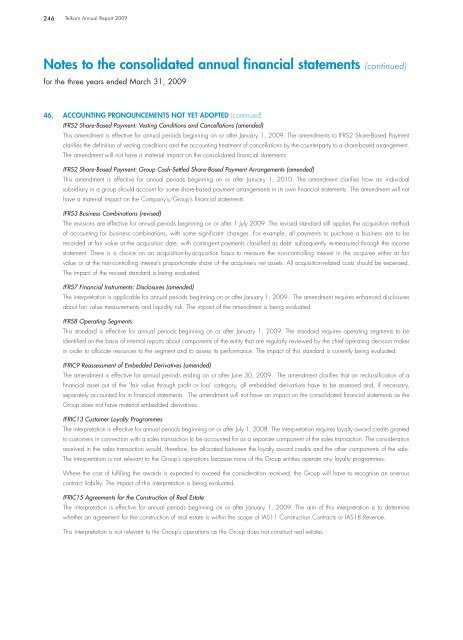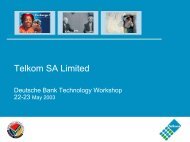Telkom AR front.qxp
Telkom AR front.qxp
Telkom AR front.qxp
You also want an ePaper? Increase the reach of your titles
YUMPU automatically turns print PDFs into web optimized ePapers that Google loves.
246<br />
<strong>Telkom</strong> Annual Report 2009<br />
Notes to the consolidated annual financial statements (continued)<br />
for the three years ended March 31, 2009<br />
46. ACCOUNTING PRONOUNCEMENTS NOT YET ADOPTED (continued)<br />
IFRS2 Share-Based Payment: Vesting Conditions and Cancellations (amended)<br />
This amendment is effective for annual periods beginning on or after January 1, 2009. The amendments to IFRS2 Share-Based Payment<br />
clarifies the definition of vesting conditions and the accounting treatment of cancellations by the counterparty to a share-based arrangement.<br />
The amendment will not have a material impact on the consolidated financial statements.<br />
IFRS2 Share-Based Payment: Group Cash-Settled Share-Based Payment Arrangements (amended)<br />
This amendment is effective for annual periods beginning on or after January 1, 2010. The amendment clarifies how an individual<br />
subsidiary in a group should account for some share-based payment arrangements in its own financial statements. The amendment will not<br />
have a material impact on the Company’s/Group’s financial statements.<br />
IFRS3 Business Combinations (revised)<br />
The revisions are effective for annual periods beginning on or after 1 July 2009 .The revised standard still applies the acquisition method<br />
of accounting for business combinations, with some significant changes. For example, all payments to purchase a business are to be<br />
recorded at fair value at the acquisition date, with contingent payments classified as debt subsequently re-measured through the income<br />
statement. There is a choice on an acquisition-by-acquisition basis to measure the non-controlling interest in the acquiree either at fair<br />
value or at the non-controlling interest’s proportionate share of the acquiree’s net assets. All acquisition-related costs should be expensed.<br />
The impact of the revised standard is being evaluated.<br />
IFRS7 Financial Instruments: Disclosures (amended)<br />
The interpretation is applicable for annual periods beginning on or after January 1, 2009. The amendment requires enhanced disclosures<br />
about fair value measurements and liquidity risk. The impact of the amendment is being evaluated.<br />
IFRS8 Operating Segments<br />
This standard is effective for annual periods beginning on or after January 1, 2009. The standard requires operating segments to be<br />
identified on the basis of internal reports about components of the entity that are regularly reviewed by the chief operating decision maker<br />
in order to allocate resources to the segment and to assess its performance. The impact of this standard is currently being evaluated.<br />
IFRIC9 Reassessment of Embedded Derivatives (amended)<br />
The amendment is effective for annual periods ending on or after June 30, 2009. The amendment clarifies that on reclassification of a<br />
financial asset out of the ’fair value through profit or loss’ category, all embedded derivatives have to be assessed and, if necessary,<br />
separately accounted for in financial statements. The amendment will not have an impact on the consolidated financial statements as the<br />
Group does not have material embedded derivatives.<br />
IFRIC13 Customer Loyalty Programmes<br />
The interpretation is effective for annual periods beginning on or after July 1, 2008. The interpretation requires loyalty award credits granted<br />
to customers in connection with a sales transaction to be accounted for as a separate component of the sales transaction. The consideration<br />
received in the sales transaction would, therefore, be allocated between the loyalty award credits and the other components of the sale.<br />
The interpretation is not relevant to the Group’s operations because none of the Group entities operate any loyalty programmes.<br />
Where the cost of fulfilling the awards is expected to exceed the consideration received, the Group will have to recognise an onerous<br />
contract liability. The impact of this interpretation is being evaluated.<br />
IFRIC15 Agreements for the Construction of Real Estate<br />
The interpretation is effective for annual periods beginning on or after January 1, 2009. The aim of this interpretation is to determine<br />
whether an agreement for the construction of real estate is within the scope of IAS11 Construction Contracts or IAS18 Revenue.<br />
This interpretation is not relevant to the Group’s operations as the Group does not construct real estates.




